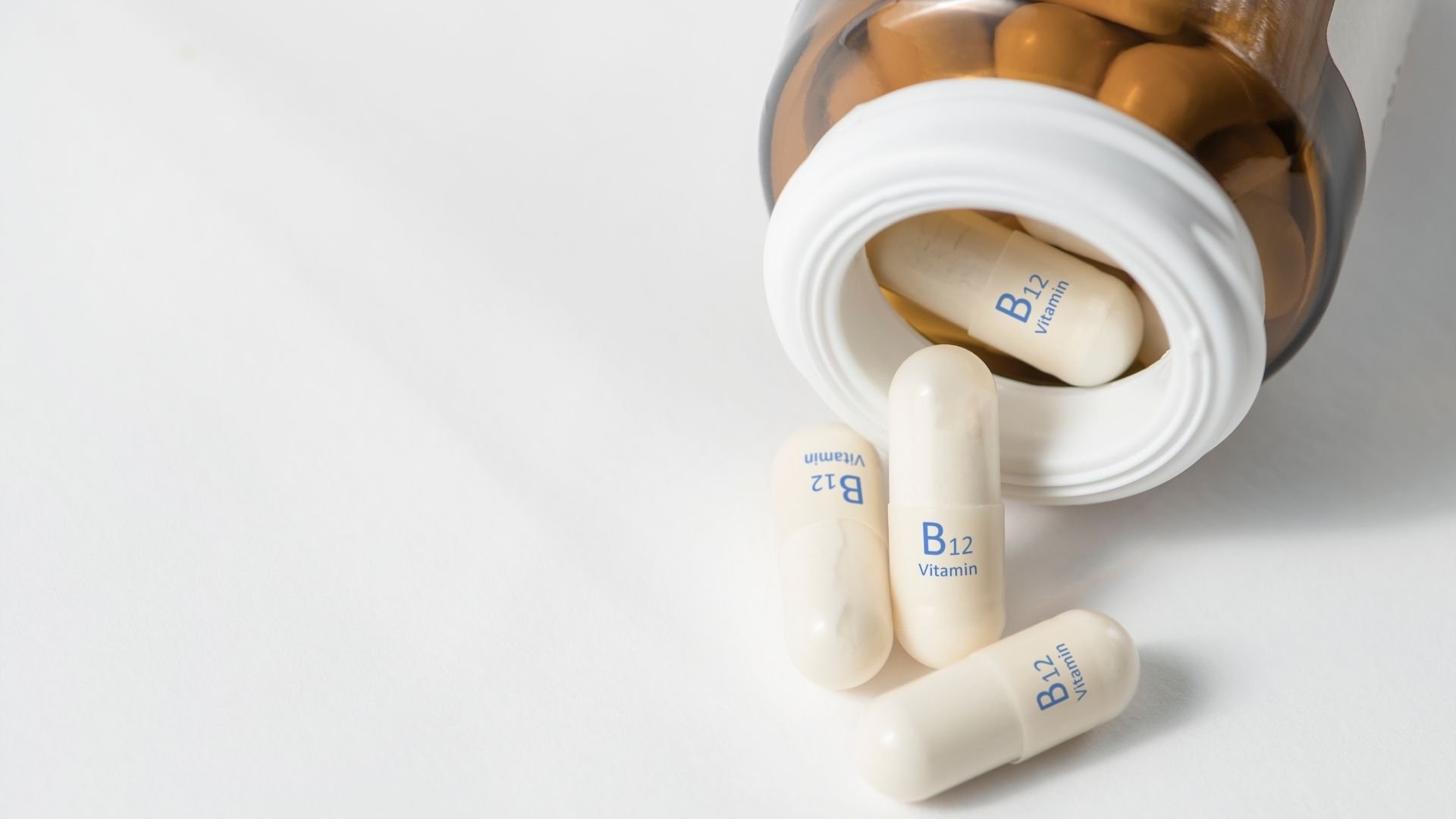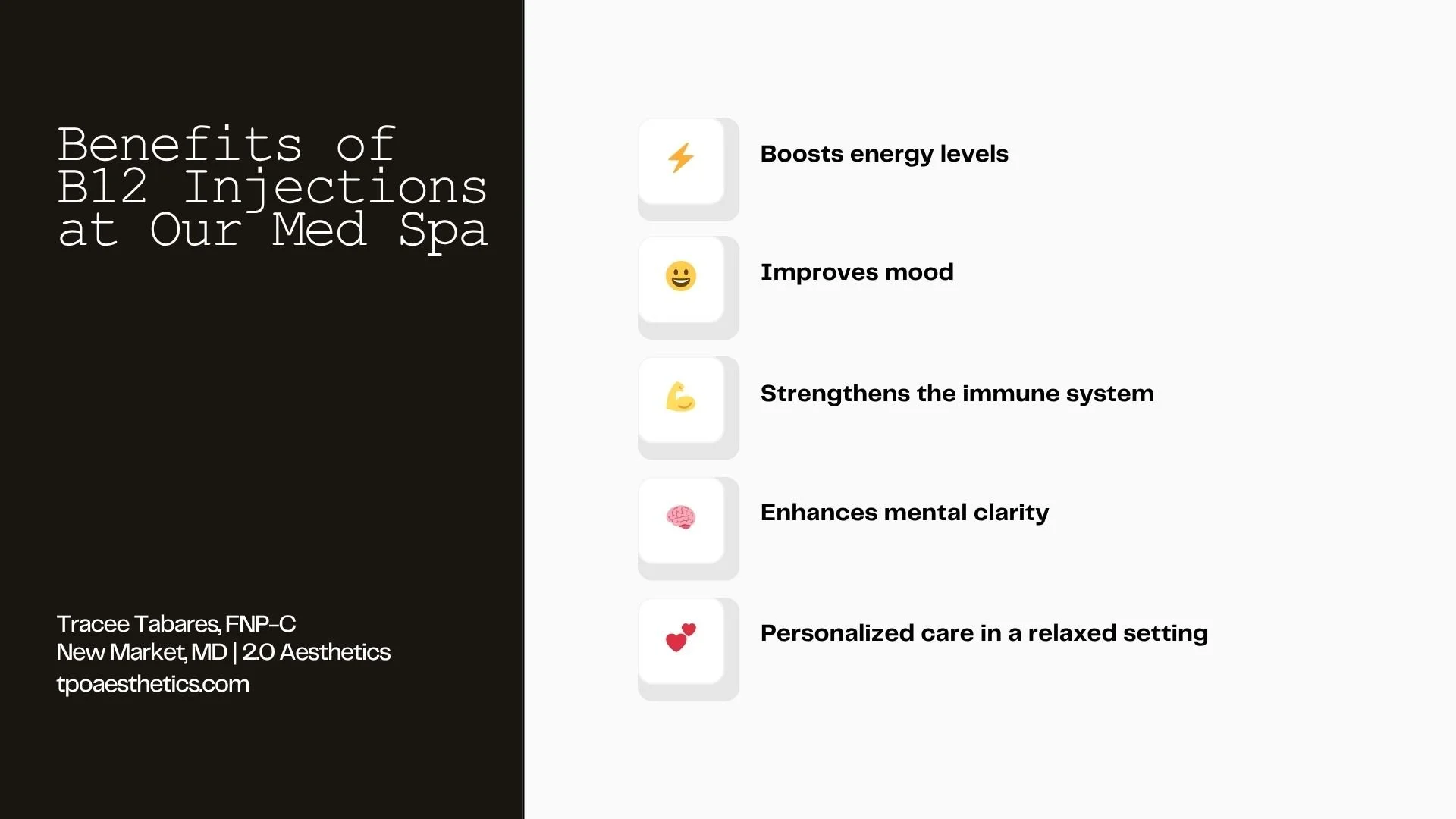Effective B12 Deficiency Treatment: Boost Your Energy and Immunity
Struggling with fatigue, weakness, or neurological issues? These could be signs of B12 deficiency. This article will guide you through B12 deficiency treatment options, helping you reclaim your health. We’ll cover dietary changes, supplements, and medical treatments to address this condition effectively.
Key Takeaways
Vitamin B12 is vital for energy production, metabolism, and brain health, making its deficiency a serious health concern.
Symptoms of B12 deficiency can vary, including fatigue, weakness, confusion, and neurological issues, making early diagnosis essential.
Treatment options range from dietary changes and oral supplements to intramuscular injections, specifically for those with absorption issues or severe deficiency.
Introduction: Why B12 Matters
Vitamin B12, also known as cobalamin, plays a crucial role in our bodies. It’s essential for energy production, metabolism, and maintaining brain health. Without adequate B12, our bodies can’t produce enough healthy red blood cells, leading to fatigue and weakness. Additionally, B12 supports the nervous system, helping to prevent neurological issues. Vitamin B is important for overall health.
Despite its importance, vitamin B12 deficiency is more common than many realize, affecting a significant portion of the population. Whether due to dietary choices, medical conditions, or other factors, many people are at risk of deficiency. Understanding the underlying cause of why B12 matters is the first step in recognizing and addressing this often-overlooked health issue.
Understanding Vitamin B12 Deficiency
Vitamin B12 deficiency occurs when there is insufficient intake or absorption of this vital nutrient. The body requires intrinsic factor, a protein produced in the stomach, to absorb B12 effectively. Without it, B12 levels can drop, leading to serious health problems.
The impacts of B12 deficiency are far-reaching. It can cause a reduction in healthy red blood cells, resulting in macrocytic anemia and megaloblastic anemia, and can lead to physical, neurological, and psychological issues if left untreated. B12 is crucial for maintaining healthy nerve cells and producing DNA, making its deficiency particularly concerning.
Sub-clinical B12 deficiency and cobalamin deficiency can develop over several years due to inadequate intake, affecting between 1.5% and 15% of the population. Addressing this deficiency promptly is essential to prevent severe long-term health issues.
Causes of Vitamin B12 Deficiency
Several factors can contribute to vitamin B12 deficiency. Certain populations, such as vegans, older adults, and pregnant women, are at higher risk and require targeted management strategies. For instance, a lack of hydrochloric acid due to conditions like gastritis can hinder B12 absorption.
Medical conditions and factors that impair the body’s ability to absorb B12 include:
Crohn’s disease
Celiac disease
Certain gastrointestinal surgeries such as gastric bypass
Pernicious anemia, a condition where the body cannot produce intrinsic factor, which is a significant cause of deficiency in many individuals.
Lifestyle factors play a role too:
Chronic alcoholism can damage the digestive system, leading to B12 deficiency and liver disease.
Effective management of digestive disorders is crucial in preventing B12 deficiency.
Avoiding drinking excessive amounts of alcohol is also an important preventive step, as these risk factors can contribute to health issues.
Symptoms of Vitamin B12 Deficiency
The symptoms of vitamin B12 deficiency can be varied and often mimic other conditions, making it challenging to diagnose. Physical signs include yellowish skin, fatigue, and weakness. These symptoms result from the body’s inability to produce enough healthy red blood cells.
Neurological symptoms are also common. Individuals may experience confusion, difficulties in walking or speaking, and even vision problems, which can be classified as neurologic symptoms. These symptoms highlight the critical role of B12 in maintaining a healthy nervous system.
Psychological symptoms can be particularly distressing. Irritability, depression, and cognitive impairment are all possible signs of B12 deficiency. Additionally, individuals experiencing symptoms might experience weight loss and a sore tongue, further complicating the clinical manifestations.
Diagnosis of Vitamin B12 Deficiency
Diagnosing vitamin B12 deficiency typically involves a complete blood count (CBC) and a specific test for B12 levels. A deficiency is usually confirmed when blood levels fall below 150 picograms per milliliter. Routine blood test is recommended for individuals at high risk of the condition, especially to ensure that B12 levels are maintained at normal levels.
Older adults, in particular, should undergo regular screening for B12 levels due to the increased likelihood of malabsorption with age. This proactive approach helps detect deficiencies early, allowing for timely intervention.
Routine screening and blood tests are essential tools in identifying B12 deficiency, especially in populations that face absorption challenges due to age or medical conditions. Early diagnosis through laboratory investigation is crucial to prevent long-term health issues associated with this deficiency.
Treatment Options for Vitamin B12 Deficiency
Treating vitamin B12 deficiency involves tailored strategies based on individual needs, especially for vulnerable populations. Lifelong therapy is often necessary due to poor absorption, emphasizing the importance of ongoing management.
Treatment options include dietary changes, oral administration, oral supplements, and intramuscular injections, as well as intramuscular therapy and certain medications. Each method has its benefits and considerations, which we’ll explore in the following subsections.
Dietary Changes
One of the most effective ways to combat B12 deficiency is through dietary changes. Including animal-derived foods such as meat, fish, and dairy can significantly boost B12 levels. For those with limited animal product consumption, fortified cereals and plant milk can be invaluable sources of B12.
Nutritional yeast, often fortified with B12, is another excellent addition to a vegan diet. Incorporating these foods into daily meals helps maintain adequate B12 levels and supports overall health.
Oral Vitamin B12 Supplements
Oral vitamin B12 supplements are a practical solution for those with mild deficiencies. When taken consistently, these oral vitamin B supplements can effectively address the deficiency. Combining oral cobalamin with folic acid tablets and folic acid supplementation can enhance the treatment’s effectiveness.
Individuals at risk of B12 deficiency, such as those with dietary restrictions or certain medical conditions, should consider daily dietary supplements to ensure adequate intake of suspected vitamin. This proactive approach can help prevent the onset of more severe deficiency-related issues.
Why Oral Supplements Aren’t Always Enough
While oral vitamin B12 supplements are effective for many, they aren’t always enough for everyone. Poor absorption due to gut health issues, medications, or lifestyle factors can limit how the body absorbs their effectiveness.
For these individuals, alternative methods like intramuscular injections may be necessary to ensure adequate B12 levels.
Intramuscular Vitamin B12 Injections
Intramuscular vitamin b12 injections are often recommended for individuals with severe deficiencies or absorption issues. These intramuscular vitamin b injections provide direct delivery of B12 into the bloodstream, ensuring guaranteed absorption.
Patients with conditions like pernicious anemia or those unable to absorb B12 through their gastrointestinal tract benefit significantly from this method. Regular injections help maintain adequate B12 levels and prevent the serious health issues associated with deficiency.
Managing B12 Deficiency in Specific Populations
Managing B12 deficiency requires special considerations for different populations. Older adults, for instance, face higher risks due to absorption challenges that increase with age. Tailored strategies are essential to ensure these individuals receive adequate B12.
Pregnant women and those with dietary restrictions, like vegans and vegetarians, need to pay extra attention to their B12 intake. Customized treatment plans and regular monitoring are crucial for these groups to prevent deficiency.
Vegan or Vegetarian Diets
Vegans and vegetarians are particularly susceptible to B12 deficiency since they avoid animal products, the primary source of this nutrient. They should rely on fortified foods like cereals and nutritional yeast to prevent deficiency.
Daily B12 supplements and fortified plant-based products are essential to meet their nutritional needs. Incorporating these strategies helps individuals following a vegan or vegetarian diet maintain healthy B12 levels and avoid deficiency-related health issues.
Preventing Vitamin B12 Deficiency
Preventing B12 deficiency is key to maintaining overall health and avoiding serious health issues. A balanced diet that includes animal-based foods typically provides adequate amounts of B12. For those on vegetarian or vegan diets, fortified foods and supplements are crucial.
Regular intake of B12-rich foods or fortified products helps keep blood cells healthy and supports overall well-being. Proactively managing diet and supplement intake can prevent the onset of deficiency and its associated health problems.
How B12 Injections Work
Vitamin B12 injections are a straightforward and effective treatment option for those with severe deficiencies. The process is quick, nearly painless, and typically done in-office. Patients can expect to receive weekly injections for the first four weeks, followed by maintenance injections every 4–6 weeks.
Personalized treatment plans are available to meet individual needs, ensuring optimal outcomes. These injections provide a reliable way to maintain adequate B12 levels and prevent deficiency-related complications.
Benefits of Wellness Injections at Our Med Spa
Receiving B12 injections at our med spa comes with numerous benefits, including:
Boosting energy levels
Improving mood
Strengthening the immune system
Enhancing mental clarity
Our med spa offers personalized care from licensed providers, ensuring each patient receives the best possible treatment at the Cleveland Clinic. Convenient, quick appointments in a relaxing setting make it easy to prioritize your health and well-being and function properly.
Long-term Management and Monitoring
Long-term management of B12 deficiency involves regular monitoring to prevent neurological damage, including subacute combined degeneration, and ensure treatment effectiveness. Monitoring both serum B12 levels and symptoms helps adjust treatment plans as needed.
Ongoing supplementation may be necessary for individuals with a history of B12 deficiency, particularly those with pernicious anemia who require parenteral administration every 1–3 months. Regular reevaluation ensures continued health and prevents recurrence of deficiency.
Final Thoughts + Call to Action
You don’t have to feel tired, foggy, or run-down all the time. Vitamin B12 deficiency is treatable with the right support, and our wellness injection services make it easy to feel like your best self again as your symptoms improve.
If you suspect you might have a B12 deficiency, don’t wait. Reach out to our med spa to schedule an appointment and take the first step towards renewed energy and improved health.
Summary
In summary, vitamin B12 is crucial for maintaining energy, metabolism, and brain health. Understanding the causes, symptoms, and treatment options for B12 deficiency empowers you to take control of your health and prevent serious complications.
By incorporating B12-rich foods, considering supplements, and utilizing intramuscular injections when necessary, you can ensure adequate B12 levels and enjoy better overall health. Don’t let B12 deficiency hold you back—get your wellness injections from our trusted Nurse Practitioner at 2.0 Aesthetics. Book your appointment today!
Frequently Asked Questions
-
Vitamin B12 is crucial for energy production, brain health, and forming healthy red blood cells. Without it, your body can't function properly, so ensuring you get enough is key to staying energized and healthy.
-
Vitamin B12 deficiency often stems from dietary restrictions, medical conditions like Crohn's disease and pernicious anemia, or lifestyle choices such as chronic alcoholism. It's important to be aware of these factors to maintain healthy B12 levels.
-
If you're feeling unusually tired or confused, you might want to get a blood test for Vitamin B12 deficiency, as symptoms can include fatigue, weakness, and even depression. It's the best way to confirm if that's what's going on with you!
-
The best way to tackle Vitamin B12 deficiency is through dietary changes, oral supplements, or intramuscular injections, based on how severe the deficiency is and what you personally need. It's important to choose what's right for you!
-
If someone has absorption issues or a severe deficiency, B12 injections are often necessary because oral supplements might not be sufficient. It’s a straightforward way to ensure they get the levels they need.
Pin this for lateR:





